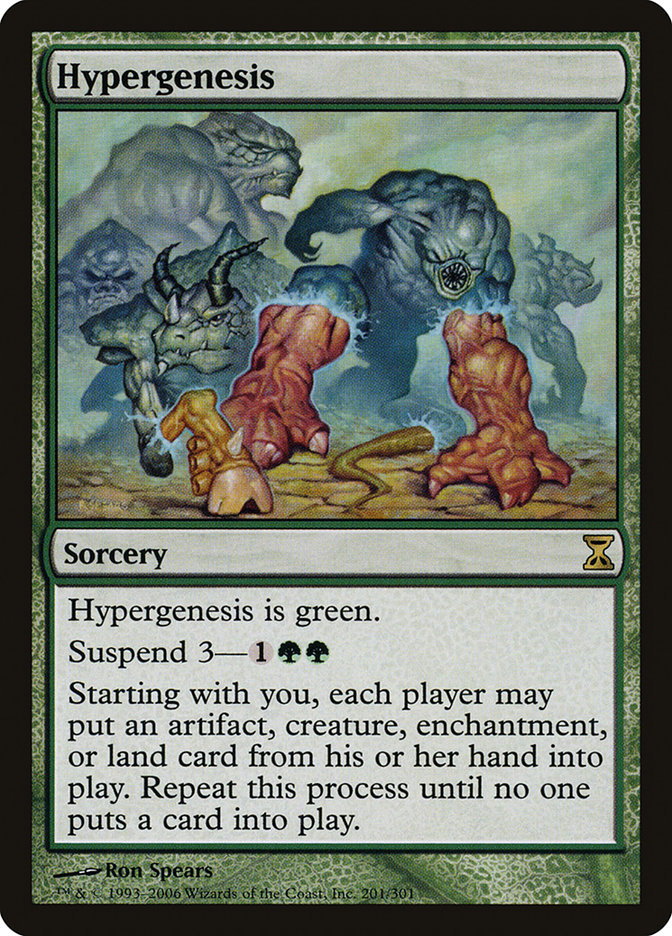
Hypergenesis
Color Indicator: Green Sorcery
Suspend 3—{1}{G}{G}
Starting with you, each player may put an artifact, creature, enchantment, or land card from their hand onto the battlefield. Repeat this process until no one puts a card onto the battlefield.
Illustrated by Ron Spears
- Standard
- Not Legal
- Alchemy
- Not Legal
- Pioneer
- Not Legal
- Explorer
- Not Legal
- Modern
- Banned
- Historic
- Not Legal
- Legacy
- Legal
- Brawl
- Not Legal
- Vintage
- Legal
- Timeless
- Not Legal
- Commander
- Legal
- Pauper
- Not Legal
- Oathbreaker
- Legal
- Penny
- Legal
Toolbox
Buy This Card
Notes and Rules Information for Hypergenesis:
- Anything that triggers during the resolution of this will wait to be put on the stack until everything is put onto the battlefield and resolution is complete. The player whose turn it is will put all of their triggered abilities on the stack in any order, then each other player in turn order will do the same. (The last ability put on the stack will be the first one that resolves.) (2006-10-15)
- Although originally printed with a characteristic-defining ability that defined its color, this card now has a color indicator. This color indicator can't be affected by text-changing effects (such as the one created by Crystal Spray), although color-changing effects can still overwrite it. (2013-06-07)
- The process ends when all players (starting with you) choose not to put a card onto the battlefield during one loop of the process. It doesn't end the first time one player chooses not to put a card onto the battlefield. (2021-03-19)
- If a player chooses not to put a card onto the battlefield but the process repeats, that player may put a card onto the battlefield the next time the process gets around to them. (2021-03-19)
- The permanents enter the battlefield sequentially. This means that ones put onto the battlefield earlier may affect how later ones enter and later ones may cause triggered abilities of earlier ones to trigger, but not vice versa. (2021-03-19)
- Suspend is a keyword that represents three abilities. The first is a static ability that allows you to exile the card from your hand with the specified number of time counters (the number before the dash) on it by paying its suspend cost (listed after the dash). The second is a triggered ability that removes a time counter from the suspended card at the beginning of each of your upkeeps. The third is a triggered ability that gives you the option to cast the card when the last time counter is removed. (2024-02-02)
- You can exile a card in your hand using suspend any time you could cast that card. Consider its card type, any effects that modify when you could cast it (such as flash) and any other effects that stop you from casting it (such as from Meddling Mage's ability) to determine if and when you can do this. Whether you could actually complete all steps in casting the card is irrelevant. For example, you can exile a card with suspend that has no mana cost or that requires a target even if no legal targets are available at that time. (2024-02-02)
- Cards exiled with suspend are exiled face up. (2024-02-02)
- Exiling a card with suspend isn't casting that card. This action doesn't use the stack and can't be responded to. (2024-02-02)
- If the spell requires any targets, those targets are chosen when the spell is finally cast, not when it's exiled. (2024-02-02)
- If an effect refers to a "suspended card," that means a card that (1) has suspend, (2) is in exile, and (3) has one or more time counters on it. (2024-02-02)
- If the first triggered ability of suspend (the one that removes time counters) is countered, no time counter is removed. The ability will trigger again at the beginning of the card's owner's next upkeep. (2024-02-02)
- When the last time counter is removed, the second triggered ability of suspend (the one that lets you cast the card) triggers. It doesn't matter why the last time counter was removed or what effect removed it. (2024-02-02)
- If the second triggered ability is countered, the card can't be cast. It remains exiled with no time counters on it, and it's no longer suspended. (2024-02-02)
- Due to a recent rules change to suspend, you are no longer required to cast the suspended card as the second triggered ability of suspend resolves. Instead, as the second triggered ability resolves, you may cast the card. Timing permissions based on the card's type are ignored. If you don't cast the card, it remains exiled with no time counters on it, and it's no longer suspended. (2024-02-02)
- If you cast a card "without paying its mana cost," such as with suspend, you can't choose to cast it for any alternative costs. You can, however, pay additional costs. If the card has any mandatory additional costs, you must pay those if you want to cast the card. (2024-02-02)
- If the card has {X} in its mana cost, you must choose 0 as the value of X when casting it without paying its mana cost. (2024-02-02)
- The mana value of a spell cast without paying its mana cost is determined by its mana cost, even though that cost wasn't paid. (2024-02-02)
- A card with no mana cost can't be cast normally; you'll need a way to cast it for an alternative cost or without paying its mana cost, such as by suspending it. (2024-02-02)
- If a card with no mana cost is given an alternative cost equal to its mana cost (by Snapcaster Mage, for example), that cost cannot be paid and the card cannot be cast this way. (2024-02-02)